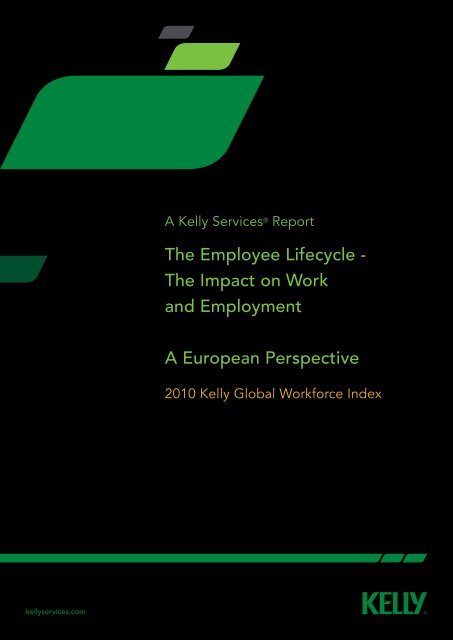Kelly Global Workforce Index
Kelly Global Workforce Index
Kelly Global Workforce Index
You also want an ePaper? Increase the reach of your titles
YUMPU automatically turns print PDFs into web optimized ePapers that Google loves.
A <strong>Kelly</strong> Services ® Report<br />
The Employee Lifecycle -<br />
The Impact on Work<br />
and Employment<br />
A European Perspective<br />
2010 <strong>Kelly</strong> <strong>Global</strong> <strong>Workforce</strong> <strong>Index</strong><br />
kellyservices.com
Introduction:<br />
Structural change in the workplace and evolving attitudes about the nature of work are beginning to impact how<br />
employees engage with their employers, and how they develop career expectations. The <strong>Kelly</strong> <strong>Global</strong> <strong>Workforce</strong> <strong>Index</strong><br />
(KGWI) examines the views of 60,000 people from 16 countries across Europe. The study uncovers what employees think<br />
about the need to adapt and re-shape their careers, in accordance with a more dynamic economic landscape.<br />
Survey respondents ranged in age from 18 to 65 and comprised the three generational groups: Generation Y<br />
(age 18 – 29), Generation X (age 30 – 47), and the baby boomer generation (age 48 – 65). Respondents either were<br />
employed within a variety of industries, or were unemployed and searching for future work opportunities.<br />
The findings of the survey were as follows:<br />
• Across Europe, 62 percent say that they expect to change their career at some stage in the future.<br />
• Approximately half of all respondents describe themselves as “very optimistic” when it comes to dealing with<br />
technological and other change in the workplace.<br />
• Two-thirds of respondents say they would be prepared to spend their own money in order to upgrade their skills.<br />
• Slightly less than half of respondents describe their employers as enthusiastic when it comes to future skills<br />
and training needs.<br />
• Approximately half of all respondents believe their employers have a clear vision for their organisation.<br />
• Some 20 percent of respondents describe themselves as ‘very active”’ in their use of social media for personal<br />
branding, while approximately 40 percent are ‘somewhat active.’<br />
• Respondents reported that the most important element in personal branding is verbal communication skills,<br />
followed by technical knowledge/ability, job résumés, written communication skills, personal attire, and use<br />
of social media.<br />
1 I 2010 <strong>Kelly</strong> <strong>Global</strong> <strong>Workforce</strong> <strong>Index</strong> I Europe
Workplace change and the employee life cycle<br />
The need for adaptation and change in the workplace has never been greater. Economic volatility, technological advances, and the<br />
continued search for productivity are all imposing immense pressure on employers and employees alike. At the same time, many<br />
employees are entering into various forms of self-employment as consultants and freelancers. All of these factors are changing the<br />
way that employees view their careers, their need for new and upgraded skills, and how they cope with change.<br />
The job life cycle and workplace change<br />
There is a growing realisation on the part of many employees<br />
that the pace of change in the workplace will have far-reaching<br />
implications.<br />
It is clear that many employees realise they will need to switch<br />
careers at some stage in their life. Not only has the job-for-life<br />
concept disappeared, but also the career-for-life concept is not<br />
far behind.<br />
The pace of technological and other change means that<br />
employees can no longer rely upon expectations of lifetime<br />
employment.<br />
Employees are responding by taking greater control over<br />
different aspects of their careers. They understand the importance<br />
of continuous learning, and have embraced the need for<br />
training. Many are even prepared to spend their own money<br />
in order to enhance their skills.<br />
A decrease in job tenure, more economic volatility, and an<br />
uncertain business environment has significantly reduced the<br />
work life cycle.<br />
Whole categories of work are becoming redundant, just as<br />
others are opening up. Skills and vocations that were once in<br />
strong demand are becoming less crucial.<br />
When employees from different sectors were asked about the<br />
likelihood of career change, it is no surprise that retail workers<br />
anticipate the most change. In recent years, the whole retail<br />
experience has been transformed by online shopping. Even<br />
companies with physical locations have reduced their headcount<br />
dramatically.<br />
The KGWI examines some key attitudes surrounding workplace<br />
change and the need for reinvention and adaptation.<br />
The results show an increasingly flexible and self-reliant mindset,<br />
in which individuals understand that they must exercise<br />
more control over their own careers.<br />
The findings show that 62 percent of respondents believe<br />
that they will have to change their career at some stage in the<br />
future. Gen X (64 percent) are slightly more likely to undergo<br />
a career change than baby boomers (62 percent) and Gen Y<br />
(59 percent).<br />
Other industries with relatively high expectations of career<br />
change include Science/Pharmaceutical, Utilities, Travel/Leisure,<br />
and Manufacturing. Those with the least likelihood of<br />
change are Government, Engineering, and Financial Services.<br />
When viewed internationally, employees in a number of European<br />
countries have relatively high expectations of career<br />
change. These include Italy, Belgium, France, and Poland.<br />
Those expecting the least change are in Portugal, Denmark,<br />
and UK.<br />
2 I 2010 <strong>Kelly</strong> <strong>Global</strong> <strong>Workforce</strong> <strong>Index</strong> I Europe
The reality facing many in the contemporary workforce is that<br />
their careers may be limited. The expertise and skills that have<br />
sustained them will not be sufficient to guarantee jobs in a<br />
rapidly evolving economy. The most common scenario happens<br />
when manufacturing jobs shift from advanced economies to<br />
developing economies with lower labour costs.<br />
There was once a time when workers anticipated a job-for-life.<br />
This has virtually disappeared. We now find that as the tempo<br />
of workplace change intensifies, even the career-for-life concept<br />
is vanishing.<br />
What is perhaps most surprising, is that the need for ongoing<br />
change is not viewed with undue concern. Most employees are<br />
actually quite optimistic about dealing with technological and<br />
other change in the workplace.<br />
But there are many other examples of jobs that are gradually<br />
disappearing. A study by Forbes found whole categories of<br />
jobs that are vanishing, including household appliances repair,<br />
milling and machine operators; word processors and typists;<br />
farm workers; graders and sorters of agricultural products;<br />
semiconductor processors; forest and conservation technicians;<br />
tax agents; textile machine operators; and even entertainers<br />
and actors who are losing out to electronic forms of entertainment.<br />
In contrast, the jobs that are growing include: designers and<br />
manufacturers of aircraft structures and composites; operators<br />
in oil and gas; counsellors of virtually all types; security and fire<br />
alarm systems installers; education, training and library workers;<br />
financial analysts and personal financial advisers; logisticians;<br />
health workers including home aides; and multimedia artists.<br />
Even for jobs in growing categories, there appears to be a<br />
trend towards shorter tenure and an expansion of some form<br />
of self-employment – freelancers and independent consultants<br />
whose work will fluctuate according to wider industry and<br />
economic trends.<br />
In particular, younger workers understand that the modern<br />
workplace is one characterised by dynamism and even entrepreneurialism<br />
– and one where flexibility and adaptability will<br />
be the hallmarks of their future careers.<br />
In these circumstances, where there is a more demand-driven<br />
model of engagement, and where the life cycle of work is<br />
being compressed, the issue of training becomes critical.<br />
This is because it enables individuals to reinvent and enhance<br />
their careers.<br />
Across Europe, 53 percent of respondents say they are ‘very<br />
optimistic,’ and 36 percent ‘somewhat optimistic,’ about their<br />
ability to keep up with technological and other changes.<br />
Gen Y and Gen X appear slightly more comfortable with the<br />
pace of change than baby boomers, but even so, there is a<br />
remarkably high degree of readiness to embrace the next wave<br />
of change.<br />
3 I 2010 <strong>Kelly</strong> <strong>Global</strong> <strong>Workforce</strong> <strong>Index</strong> I Europe
Employer ‘vision’ and the development of human capital<br />
When individual employees make critical decisions about their future jobs and careers, they not only look into their own repertoire<br />
of knowledge and experience, they also examine the capabilities of their employers. And based on what they see, they make<br />
important judgements about the future.<br />
Training as the pathway to career<br />
development<br />
In an environment where individuals are subject to ongoing<br />
workplace change, and where they are required to continually<br />
assess their skill levels, the issue of vocational and professional<br />
training takes on the utmost importance.<br />
Training becomes the key to future capability, relevance, and<br />
prosperity. Without the right skills, job prospects simply dry up.<br />
Training is a way for individuals to guard against changes that<br />
could marginalise them in the labour market. They have to<br />
make a series of judgements: Which new skills will emerge and<br />
which will diminish? How do these new skills fit an employee’s<br />
current capability? What training will be needed? Who will<br />
provide it? Who will pay for it? How long will it take? How will<br />
it affect future income?<br />
Overall, it is not a particularly encouraging picture from the<br />
employees’ perspective. The recent business and economic<br />
volatility has likely focussed employees’ attention on exactly<br />
where their organisation is going.<br />
If business leaders are not communicating their own organisational<br />
vision, it is little wonder that employees are confused,<br />
and are choosing to take their careers into their own hands.<br />
On a related issue, respondents were asked about the attitudes<br />
of employers towards the future skills and training needs<br />
of their employees.<br />
Overall, 16 percent describe the attitude of employers toward<br />
skills and training as ‘very enthusiastic’ while 30 percent say<br />
it is ‘enthusiastic.’ A total of 37 percent are neutral, while 17<br />
percent are ‘resistant.’<br />
A critical component of this decision-making process relates<br />
to the capacity of employers. Employees look to their employers<br />
for guidance and vision concerning where the organisation<br />
is headed and, by implication, where they themselves are<br />
headed.<br />
When employees were asked to assess their employers’ vision<br />
for the future, less than half believe their bosses have charted<br />
a clear direction. Overall, 45 percent of respondents say that<br />
their employer has a clear vision of where the organisation<br />
is headed. Gen Y has a slightly higher assessment of their<br />
employers’ vision (47 percent) than Gen X and baby boomers<br />
(both 43 percent).<br />
This is not a terribly flattering picture, as more than half of employers<br />
lack a coherent vision for training. Gen Y seem to be<br />
benefitting more from organisational training than their older<br />
counterparts, but a large proportion across all age groups<br />
clearly feel that future skills needs are being overlooked.<br />
Employees are responding by taking greater control over their<br />
careers. They understand the importance of continuous learning,<br />
and are embracing the need for training.– Many are even<br />
prepared to spend their own money in order to enhance their<br />
skills.<br />
4 I 2010 <strong>Kelly</strong> <strong>Global</strong> <strong>Workforce</strong> <strong>Index</strong> I Europe
When asked, two-thirds of respondents say they would be prepared<br />
to spend their own money on upgrading their skills – in<br />
effect, not depending on their employer.<br />
These findings are consistent with earlier 2010 KGWI studies.<br />
The results showed training as the most important non-salary<br />
benefit for all employees, ranking ahead of such benefits as<br />
health care, motor vehicles, laptops, and time off from work.<br />
This seems to reflect an understanding that additional training<br />
enhances a career and is an investment in the future.<br />
Younger workers are more willing to invest in training than<br />
older workers. This is also a discernable international trend,<br />
with extraordinarily high personal commitments to training in<br />
countries such as Ireland, Poland, Russia, Luxembourg, Portugal,<br />
and Switzerland. At the other end of the scale, 50 percent<br />
or fewer in Hungary, Norway, and Denmark are prepared to<br />
spend their own money on training.<br />
5 I 2010 <strong>Kelly</strong> <strong>Global</strong> <strong>Workforce</strong> <strong>Index</strong> I Europe
Personal branding and career independence<br />
As employees become more active in taking charge of their careers, they are utilising a range of tools to help market their<br />
identities, or personal ‘brands.’ The advent of social media has given new strength to personal branding, but it is not the only path<br />
employees are taking to help them stand out.<br />
Employee differentiation gathers speed<br />
In an era when many workers are entering into various forms of<br />
self-employment, employees are taking greater responsibility<br />
for their personal marketing, or ‘branding,’ that will help them<br />
stand out in a crowded employment market.<br />
Individuals are using a range of tools to help promote themselves<br />
to potential employers.<br />
Yet despite the growth of social media and the apparent<br />
upsurge in its work-related use, most employees say they still<br />
prefer more traditional means of personal marketing.<br />
The most important element in personal branding is verbal<br />
communication skills, followed by technical knowledge/ability,<br />
job résumés, written communication skills, personal attire, and<br />
use of social media.<br />
New forms of social media such as Linkedin, Facebook, and<br />
Twitter have provided a platform to facilitate this enhanced<br />
personal marketing, and many employees are embracing it<br />
with enthusiasm.<br />
Across Europe, 20 percent of respondents describe themselves<br />
as ‘very active,’ and 41 percent ‘somewhat active,’ when it<br />
comes to the use of social media to enhance their personal<br />
brand.<br />
Not surprisingly, Gen Y is most active, but the use of social media<br />
for career development purposes has spanned the generations,<br />
with both Gen X and baby boomers also participating.<br />
The emergence of social media, including blogs and networking<br />
sites, has provided enormous scope for individuals to<br />
showcase their credentials to a vast audience. The trend has<br />
tipped some of the power in the recruitment equation back<br />
to the employee, who can now develop a significant online<br />
persona, and reach thousands of prospective employers from<br />
around the world.<br />
The findings demonstrate the unusual position that social media<br />
currently occupies in the world of Human Resources. On the one<br />
hand, it offers unmatched exposure to a network of professional<br />
colleagues and recruitment experts. On the other hand, many<br />
users appear to be concerned about pushing their social media<br />
presence beyond a reasonable limit.<br />
There may also be concern about how a social media presence<br />
can backfire. This occurs when private information is revealed<br />
publicly, with potentially negative ramifications. In a world still<br />
coming to terms with how this vast amount of new information<br />
is likely to be used, many employees remain cautious.<br />
Certainly, there is a clear view that skills such as reading, writing,<br />
and technical abilities should take precedence over social media<br />
when it comes to personal marketing.<br />
The emphasis placed on personal branding reflects a wider<br />
trend to greater independence and entrepreneurialism that is<br />
occurring across the workforce.<br />
With job tenure shortening, and a greater mobility of the labour<br />
force, employees are becoming more adept at using the tools of<br />
the commercial world to enhance their identities and skill sets.<br />
6 I 2010 <strong>Kelly</strong> <strong>Global</strong> <strong>Workforce</strong> <strong>Index</strong> I Europe
Conclusion<br />
The evolution of the workforce into a more dynamic and even entrepreneurial state is beginning to show up in the way that<br />
employees think about and plan their careers. The pressure for ongoing workplace improvement means that employees and<br />
employers are being required to reassess some longstanding approaches to jobs and recruitment.<br />
The latest findings of the <strong>Kelly</strong> <strong>Global</strong> <strong>Workforce</strong> <strong>Index</strong> reflect<br />
an understanding on the part of most employees that the days<br />
of lifetime employment gone. Increasingly, many people will<br />
have several careers and, in all likelihood, will have to take<br />
greater personal responsibility for managing their careers and<br />
developing new skills.<br />
This will not always be an easy process. It will be most suited to<br />
growing areas of the economy where new skills and opportunities<br />
are emerging – typically in highly trained positions. As this<br />
mobility and dynamism gathers speed, many people will step<br />
outside of the traditional employment relationship and adopt<br />
more entrepreneurial modes of work.<br />
Because of these trends, individuals are looking into the future,<br />
assessing their skills, and evolving to meet new requirements.<br />
There will be a greater focus on continuous learning.<br />
The duration of work will also change. The idea of decades in<br />
one job or career will give way to shorter-term assignments<br />
that will require dexterity and flexibility.<br />
In an earlier era, such changes would probably have been<br />
viewed unfavourably. What is indisputable, is that the overwhelming<br />
majority of respondents are comfortable coping with<br />
change. The fact that they might experience a career change is<br />
taken for granted.<br />
It seems reasonable to conclude that the fear of change is<br />
not what it might have been. Individuals are responding by<br />
examining their skills and making judgments as to what will be<br />
needed, now and in the future.<br />
Career management will no longer be outsourced to an employer.<br />
Individuals will take greater charge of their careers, and<br />
choose the paths that fit their expertise and passions.<br />
This opens up a process of discovery, as employees assess,<br />
develop, and deploy new skills. It also opens up a new era of<br />
work – one that is less predictable, but quite possibly more<br />
personally satisfying.<br />
About <strong>Kelly</strong> Services<br />
<strong>Kelly</strong> Services, Inc. (NASDAQ: KELYA, KELYB) is a leader in providing workforce solutions. <strong>Kelly</strong> offers a comprehensive array<br />
of outsourcing and consulting services as well as world-class staffing on a temporary, temp-to-hire and permanent placement<br />
basis. Serving clients around the globe, <strong>Kelly</strong> provides employment to 480,000 employees annually. Revenue in 2009<br />
was $4.3 billion.<br />
For more information about the KGWI findings, please visit kellyservices.com or contact the EMEA Marketing Department<br />
by e-mail (emeahq@kellyservices.eu) or by phone (+41 32 737 1800).<br />
7 I 2010 <strong>Kelly</strong> <strong>Global</strong> <strong>Workforce</strong> <strong>Index</strong> I Europe










